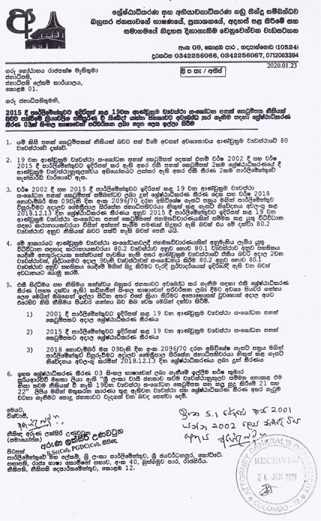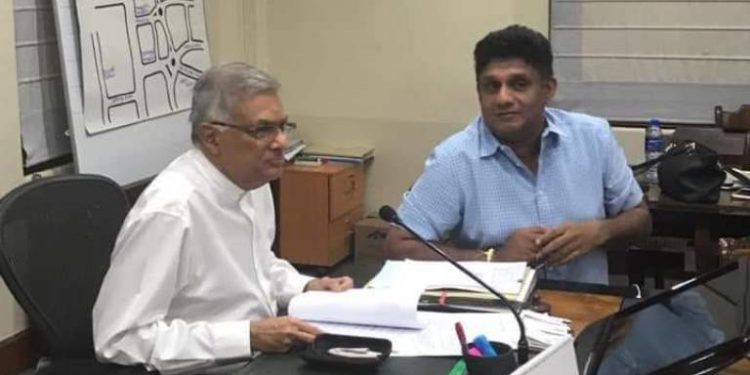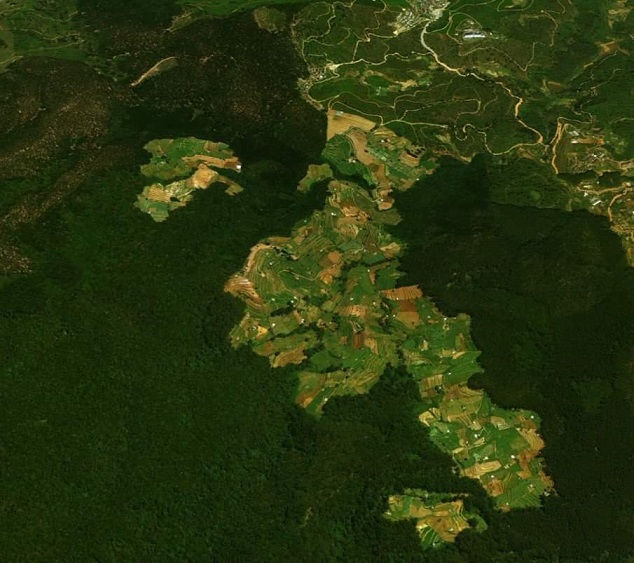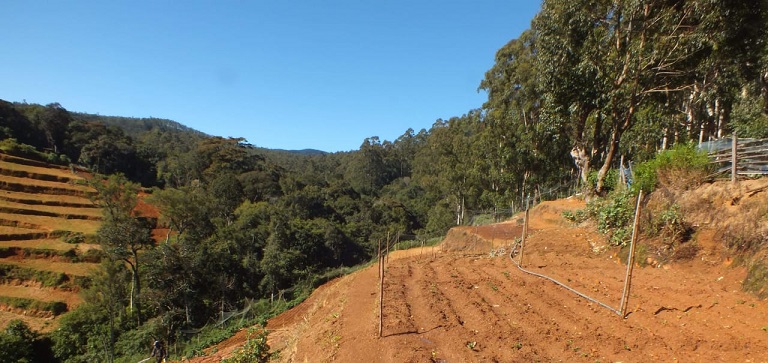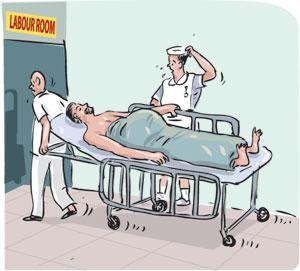Misguided Tamils: A Threat to National Unity
January 24th, 2020Dr. Daya Hewapathirane
History of the Tamil Community of Sri Lanka
The small communities of Tamils and Muslims living in Sri Lanka, amount to about 24% of the island’s total population with Tamils including Estate Tamils accounting for 15% and Muslims 09%. These communities are descendants of groups of individuals, exclusively males, who arrived in this island at different times in the past for various purposes, and later settled down among the indigenous Sinhala people. Tamils came from southern India and continue to observe the cultural traditions of their homeland which is Tamilnadu, where the Tamil culture including the Tamil language originated. Tamils in general, therefore are a settler community in the island with the rights and privileges enjoyed by the indigenous Sinhala people. However, it is important to note that Tamils are indigenous to the Tamilnadu which is the birth-place of the Tamil culture and language. For all purposes, the national and cultural homeland of the Tamils is Tamilnadu.
Tamils arrived in the Jaffna peninsula in the 16th century
Initially the Tamils came to the island as invaders and mercenaries. Since the 3rd century BCE, there were seventeen Tamil-speaking Dravidian invasions of the Sinhala kingdom when Anuradhapura and Polonnaruwa were the Sinhala royal capitals. These invasions were associated with extreme forms of violence and destruction. After defeat some Tamils fled to India while some remained in Sri Lanka with some settling down in the Jaffna peninsula. Historians H.W. Codrington, Fr. S.G. Perera, and Mudaliyar C. Rasanayagam mentions clearly that the Jaffna peninsula was peopled by the Sinhala Buddhist community before the sixteenth century. This is confirmed by archeological evidence of the remains of stupes and viharas in the peninsula, and by the large number of Tamilized Sinhala place names in the Jaffna peninsula and in the Northern Eastern region of the country where Tamils and Muslims predominate at present. In the 16the century and thereafter, for many years, the Sinhala Buddhist people in Jaffna lived together with Tamil immigrants from South India, in harmony. The famous Portuguese historian Fernao De Queyroz mentions in his book, that when the Portuguese arrived in the island in early 16th century, the Jaffna region was, like other 14 regions of the country at that time, managed by a sub-king, who paid tribute to the Sinhala King (or ‘Emperor’) in Kotte. Some Tamils cite the Rama-Ravana story to claim that Tamils were in the island in ancient times. The eminent historian A.L. Basham has called this Ramayana story as bluff and has shown that the Ramayana is a work of fiction by Valmiki, who drew his plot and characters from the Dasaratha, Jataka and the Valahassa Jataka of the Buddhists.
It is a fact that the Sinhala people, starting with their kings and leaders of the past, have been quite accommodative of the Tamils and others who made Sri Lanka their home. Although they came as invaders, mercenaries, merchants, illegal immigrants and so on, they were permitted to settle wherever they pleased and live according to their cultural norms without any harassment. They were/are permitted to move anywhere in the country, and be involved in whatever gainful employment they wished anywhere in our country. They were/are allowed to build their Tamil schools, Hindu kovils and conduct their religious and cultural activities just the way they did in their motherland – Tamilnadu.
Privileges During the British Colonial Period in Sri Lanka
During the British colonial period which started in the 18th century, under the British colonial policy of divide and rule”, massive favoritism was accorded by the British to Tamils, in return for the support of Tamils as quislings to crush Sinhala resistance to British occupation of the island. To serve their self-interests, the British policy set one community against the other. The British gave special privileges to the Tamil minority and those of the Christian faith. They included better opportunities for education, employment, and government services in general. Tamils soon became a privileged community. To cite one example, in terms of the density of schools per unit area, the Jaffna district had the highest density. In 1870 there were only two Buddhist schools left in the country – in Panadura and Dodanduwa as against 805 Christian Schools. As a result, even in 1956, eight years after Independence, the Tamils, then a mere 11% of the population, held 75% of the jobs in the army and 65% of the jobs in the public service.
All colonial powers of the island, acted on pure and absolute self-interest”. British occupation of Sri Lanka was one of sheer exploitation and devastation. Whatever benefits that were derived by local inhabitants were merely incidental to their exploitation of the country’s natural and human resources to reap enormous benefits for the British government. The vast changes that they brought about in almost all areas of life in the country, led to the disruption of the long-held culture, values, and way of life of local Sinhala Buddhists. Under the infamous Waste Lands Ordinance” of the British, commercial plantations of coffee, tea and rubber were established on lands expropriated from the rural Sinhala people, without compensation. The dispossessed Sinhala people were unwilling to work on the plantations and in the 19th century and thereafter, the British imported Tamil laborers from South India to work as labourers in plantations. These Tamils later became a new element in the demographic composition of the country. Most of these Tamil labourer community in the highlands of the island, stayed behind and most of them were accorded citizenship in later years after the country attained political independence.
Post- Independence Privileges
It is important to note, that even during the post-independence era, the Tamils have been permitted to move anywhere in the country, and be involved in whatever gainful employment they wished anywhere in our country. They were/are allowed to build their Tamil schools, Hindu kovils and conduct their religious and cultural activities just the way they did in their motherland – Tamilnadu. Tamils have been accorded official recognition by their representation in our national flag by means of the orange colour band; Tamil culture is recognized by the State and their major cultural days are public holidays; The Tamil language is officially recognized as a national language of the country; Hinduism the main religion of Tamils is recognized by the State and its religious days have been declared as national holidays.
Emergence of Tamil Racism, Extremism, and Separatism
In the 1950s and 60s, there were many South Indian Tamil films produced, directed and acted by extremist South Indian Tamils that were directly propagating Tamil racism and extremism. These films were imported to Sri Lanka and were popularly watched by Sri Lankan Tamils. The directors, script writers and movie stars of these crude films were well known Tamil extremists with political overtures. They soon became leading political figures in the Tamilnadu political scene, promoting the so-called Tamil cause and Tamil separatism. Among them were Karunaneedi, M.G. Ramachandran, Shivaji Ganeshan and the infamous Jayalalitha. The whole purpose of these low-budget films was to generate Tamil racism and a sense of Tamil superiority. These films were shown widely in Sri Lanka and were quite popular among the Tamils in Sri Lanka. The extreme racist attitudes that these films and the Tamil media helped to generate at that time, made Tamils feel elevated and politically motivated to seek special privileges including separatism. The extremist Tamil attitude made them want to take control and began talking about Tamil nationalism, Tamil national struggle and Tamil homeland and so on. Some Tamil extremists resorted to dishonesty, falsehood, fabrications and deliberate misinterpretation and distortion of historic facts pertaining to Sri Lanka. Eventually they resorted to terrorism to establish themselves as a force to reckon with among the majority Sinhala people.
Undue Privileges as a Minority
Tamils – as a small minority community enjoy undue privileges that are not enjoyed by the majority Sinhala community in the country. In fact, no other minority community in any major country in the world enjoys the privileges that the Sri Lankan Tamils enjoy. Today, and for many years in the past, more than half of the Tamil population of Sri Lanka lives among the Sinhala people in predominantly Sinhala areas in the Western, Southern, Central, and Eastern parts of the island. Here, they have their kovils and festivals, thoosa kades, their Tamil newspapers, magazines, videos, music audios, films and free to intermingle with others in their neighborhood without being harassed.
Tamils have the opportunity of living and owning property including real estate anywhere in the country. About 31% of all privately-owned land in Sri Lanka belongs to the 12% Tamil population, compared to the Sinhala who own 51% of land although they are more than about 75% of the population. About 70% of the land, and 85% of the businesses, in the administrative and residential capital, Colombo, are owned by Tamils. The per capita income of Tamils is far greater than the indigenous Sinhala people (estimated to be twice that of the Sinhala) and the rate of unemployment of Tamils is half that of the Sinhala. More than 30% of professional and managerial jobs are held by this less than 12% minority.
Most Tamils are either businessmen or professionals and are dependent on the Sinhala people for their business and professional success. They earn their living using the Sinhala market, Sinhala clients or Sinhala people. Sinhala employers hire Tamils as employees. However, it is well evident that Tamil employers rarely if at all, employ Sinhala people in their establishments. Some of the largest wholesale and retail businesses in Colombo are owned and run by Tamils. Most jewelry establishments, travel agencies, telecommunications outlets are owned and operated by them. The rich Tamils in Colombo and other urban areas in Sinhala areas are owners of the high-priced property including land and houses and expensive vehicles. In fact, the children of these well-to-do urban Tamils attend leading schools in the country, including expensive international schools.
No comparable minorities (including Indians, Pakistanis, Sinhalas, and Tamils etc. in the UK) in any major country have been given such preposterous benefits and opportunities, which are not rights but ridiculously high privileges. Since the privileges of one person can only be had at the expense of the rights of another, this shows that, in fact, it is the indigenous Sinhala’s 75% of the population, who are discriminated against.
Tamil Terrorism and its Subjugation
Terror in its worst forms never known in our land was experienced during the invasion and rule of the Dravidian Kalinga Magha (and in more recent years under the Tamil terrorist Prabakaran). The crime-prone rule of Kalinga Magha prevailed for 21 years. The Tamil Pandyan and Tamil Nayakka intrusion into Sinhala royal families led to the Sinhala royalty going into disarray after the 13th century, and the eventual decline of the stability and magnanimity of the Sinhala Buddhist nation.
During a good part of the past four decades, Tamil terrorists of the LTTE, took away from the indigenous Sinhala majority, what they valued and cherished most as a nation – their freedom and peaceful life. During this time, most Tamils living within and outside Sri Lanka were openly or discreetly supportive of terrorism and separatism propagated by the racist LTTE terrorists under Prabakaran, their ruthless leader. The overwhelming majority of Sri Lankan Tamils living overseas, were helping, both directly and indirectly, often using deceitful means to the Tamil terror movement in Sri Lanka thereby promoting gruesome, hideous, and horrifying terrorist activities against the nation, its Sinhala leaders, Bhikkhus, military and police personnel. They helped bomb and destroy reputed historically significant Buddhist monuments and sites in our country, and other public property of value and took action to disrepute and undermine the legitimately elected government of our country.
The Sinhala nation is eternally grateful to the Ranaviru Sinhala sons and daughters for eliminating from our nation, this treacherous racist terrorist menace in the year 2009. Sinhala leaders at the time understood that for the emancipation of our nation, there can be no compromise with terrorists and their cohorts both local and foreign. The territorial integrity and sovereignty of our motherland is of fundamental importance to us, and the nation is ever grateful to those who led our military forces to eradicate Tamil terrorism and for restoring our nation for the present and future generations. Thousands of true sons of the soil sacrificed their precious lives while serving in the military forces. The nation is grateful forever for the sacrifices they made to bring peace to our people
Our heroic military personnel who were making untold sacrifices to protect our people and the territorial integrity of our country were subject to extreme forms of indignity, insult, and disgrace by these Tamils, especially during the period of conflict, using most deceitful and dishonest accusations. Our illustrious national culture and our Buddhist Sangha community responsible for nurturing, promoting, and uplifting our outstanding national culture for some two thousand three hundred years, were subject to debase and disrespect by these treacherous Tamil racists and extremists. Buying over and using the international media and other means, these overseas Tamil extremists were involved openly in a widespread campaign, using the basest forms of falsehoods and blatant lies of unimaginable proportions, to demean, discredit and destroy the good image of our country
Many remnants of these ruthless LTTE terrorists, especially those living overseas, continue to subscribe to the vicious extremist attitudes of the defunct Tamil LTTE. They continue to propagate extreme forms of deceitful and divisive propaganda against Sri Lanka. They resort to dishonesty, deliberate misinterpretation and distortion of historic facts pertaining to our country. These are people who were, at one stage, actively involved in criminal activities and atrocities of the murderous LTTE. By such actions they display their treachery, deceit, and gruesome anti-national attitudes towards a nation that did much for their benefit.
The Best of Both Worlds
It is noteworthy, that throughout the period of conflict and thereafter, more than half the Tamil population of Sri Lanka were living in predominantly Sinhala areas, among the Sinhala people without any harassment. Since the end of the conflict in 2009, the number living in Sinhala areas of the south have shown a striking increase. Most of them are either businessmen or professionals, some working for the government and others lucratively self-employed. The Sinhala people of the south have been their growing clientele and patrons. Most Tamil businesses are primarily dependent on the Sinhala market for their survival. In other words, they earn their living using Sinhala hospitality and Sinhala clients. However, despite this accommodative spirit of the Sinhala people, what is clear is the fact that the Tamil employers rarely employ Sinhala employees in their establishments.
Some of the largest wholesale and retail businesses in Colombo are owned and operated by Tamils. Most jewelry establishments, travel agencies, telecommunications outlets are owned and operated by them. The rich Tamils in Colombo and other urban areas in Sinhala areas are owners of high-valued property including land, houses, vehicles, and other luxuries. They are constantly involved international travel. They have their religious and cultural organizations, their ‘kovils’ and related activities with no restrictions placed on them by the Sinhala community. The Sinhala community heavily patronizes the Tamil food outlets such as the ‘thoosa kade’. In addition, they have their Tamil newspapers, magazines, videos, music audios, films and are free to intermingle with others in Sinhala neighborhoods without being harassed.
Threat to the National Unity and Territorial Integrity
Some of the Tamil extremists either fail to understand or wish to overlook the true reasons for or circumstances surrounding the racist Tamil terrorist menace in our motherland. It appears that Tamil extremists do not want to accept the fact that, all along, he biggest impediment to overall progress of our country and the well-deserved well-being of our people at large has been this savage Tamil extremism and terrorism. It is well-known that it was this racist Tamil terrorism that has brutalized and stunted our nation during the past few decades.
From their attitude and actions, it is well evident that the Tamil community in the country has posed a threat to national unity and territorial integrity of the country. They have resorted to actions that undermine the way of life of other communities, and in a covert manner to democratic principles and rule of law of the country. They rarely if at all participate in national events. They do not participate in the singing of the National Anthem in public events. Recently a Tamil Minister who was the Chief Guest in a public function, refused to hoist the National flag. The polarization tendency and divisive spirit of the Tamil community is self-imposed and not because they are marginalized. The long-term implications of these separatist -extremist trends are highly undesirable for the unity and the maintenance of peace and stability in the country. One should not overlook the fact and take for granted the long-standing opportunity for peaceful cohabitation of different communities, provided by the traditional cultural foundation established by the Sinhala people of this nation.
The National Culture
All salient aspects
of our national culture – tangible and intangible, either grew or evolved
within the borders of our country. Sinhala language and literature originated
in Sri Lanka. Sinhala language in fact is the most important defining element
of our nation’s culture and heritage, from historic times. The Sinhala language
grew out of
Indo-Aryan dialects and exists only in Sri Lanka and has its own distinguished
literary tradition. Sinhala is one of the world’s oldest living
languages. There have been a wide range of languages in the world,
particularly in Asia which lived and died without leaving
evidence of their existence, because they were never written down. This is not
the case with the Sinhala language. All other languages used in Sri Lanka
originated in other countries. It is significant to note that the
overwhelming majority of people of Sri Lanka are distinguished by their
language – Sinhala, which even today has a strong unifying effect in our
motherland helping to reinforce the solidarity of our people as a unique
cultural entity in the world. Almost all place names of the country from
historic times, are in the Sinhala language – in the North, South, East, West
and Central regions.
Indigenous national sovereignty of a country is an inalienable right
based on profound justice. Sovereign national rights of Sri Lanka rests with
the Sinhala people who are indigenous to this country, forming its dominant
majority community for over 2500 years. Sri Lanka is the only national
sovereign motherland of the Sinhala people. Their culture, way of life and
their Sinhala language originated and developed in Sri Lanka.
Conforming to National Cultural Norms and Values
The non-indigenous settler communities such as the Tamils and Muslims are expected to conform to the norms and values of the Sinhala Nation to which they belong today. They may have brought various ethnic, cultural, and religious customs, traditions, traits and values from their original nation and homelands where their cultures evolved and consolidated. They are free to maintain these cultural norms if they do not conflict with the norms and practices of the Sinhala Nation of which they are now a part. Once the non-indigenous persons become a part of the Sinhala Nation it not only becomes their national obligation, but more importantly, it is to their advantage to become a part of the nation by learning and understanding the norms of the Sinhala nation where they now belong, and where they have been accepted as non-indigenous nationals by the indigenous Sinhala people. When a foreigner or a person not indigenous to a country migrates into the country, and decides to make it his home, it is incumbent on that person to learn about the history, norms and traits of the new country and its people. The new immigrant is expected to acknowledge, subscribe to, and integrate into the new nation of which he now is a part. The same applies to all descendants of non-indigenous immigrants, who may have been born and raised in the new nation
National Rights and Individual Rights
Indigenous Sinhala nationals or the Sinhala people are the founders of the Sinhala or Hela Nation, and are entitled to special national rights. Important in this regard is the promotion, protection and preservation of their culture, language, social system, and values that characterize their Sinhala Nation. Sinhala should be restored as the sole national and official language of the country. Promotion and preservation of the Sinhala Buddhist culture as the national culture, should receive priority attention. It should be made a mandatory subject in the school curriculum. The national anthem of the country is sung in the Sinhala language. The minority communities are not entitled to such special privileges, because the Sinhala nation was founded by the Sinhala people and is the legitimate home of the Sinhala people. Sinhale is not the home of other cultures and languages. These cultures and languages did not originate or evolve in this land unlike the case with the Sinhala culture and Sinhala language. Therefore, the cultures and languages of minority communities cannot and are not entitled legitimately to be accorded national or official recognition at par with the Sinhala culture and language. However, these communities are free to observe and preserve their cultural activities and their languages within their communities. As far as ordinary human rights are concerned, members of minority settler communities are entitled to the same human rights as those enjoyed by members of the mainstream Sinhala community.
As a nation with a historic cultural tradition that extends to over 2200 years, where the founding principles have been freedom, compassion, tolerance, and accommodation of people of all faiths and ethnicities, it is necessary that the true patriots of Sinhale, the Sinhala nation, get to the forefront, mobilize themselves and take legitimate actions to protect and uphold these wholesome cultural traditions, and thereby reinforce the Sinhala nation – Sinhale. All citizens of the country who subscribe to the Sinhale Nation and respect the cultural norms and values that characterize this nation, will find acceptance as members of the Sinhale nation, irrespective of their ethnic and religious affiliations and differences. The Sinhale Nation incorporates the tremendous cultural wealth of the Sinhala people recognized the world over for its richness and uniqueness. This should be preserved and promoted for posterity. Those who undermine the nation’s cultural heritage, sovereignty and territorial integrity are enemies of the nation and should be confronted and subdued forthwith, for the welfare of the nation.
Strengthen and Revitalize the Sinhala Nation
For the patriotic and caring nationals of this island, especially those of the Sinhala community, irrespective of their religious affiliations, there is one moral law that stands above everything else, and that is to do everything possible to strengthen their Sinhala Nation and to curb the efforts of anti-national elements both local and foreign, engaged in violating and undermining Sinhala Buddhist national interests. It was with such an attitude and approach that enabled our valiant Sinhala soldiers to wipe out anti-national, separatist Tamil terrorists who were hell-bent on destroying the integrity of this nation.
The present generation of Sinhala nationals has a moral obligation to protect, preserve and promote the greatest of their inheritance, their unique nation, for the survival of their Buddhist cultural heritage and for the benefit of future generations. Concerned Sinhala nationals will under no circumstances allow the sovereignty, the distinct territorial integrity and the all-pervasive Sinhala Buddhist cultural character of the island be subject to any form of disarray or disintegration. They will not permit any force, internal or external, ethnic, or religious, to subjugate or undermine the integrity of the Sinhala Buddhist culture of this island nation.
Sinhala history is replete with valor and courage in battles against overly superior forces. The struggle against extremism and the looming division of this Sinhala island nation of ours demands our full national strength. Let all Sinhala nationalists rise to the occasion, forgetting for a moment their ‘other’ differences, and swear allegiance to the unity of this country by giving unswerving support to those commendable organizations that have emerged in recent times to save the nation from undesirable elements. The renewed loyalty that is fast emerging among the Sinhala nationals, particularly among the contemporary youth, is most encouraging.
Violation of Sovereignty and National Integrity
In recent times, movements and organizations have sprung up under the initiative of some concerned Bhikkhus and members of the Sinhala community across the country, with an increasingly large following of the nation’s youth, to highlight and draw attention to the vital and pressing need for necessary action to restore, protect and uphold the legitimate national rights and privileges of the Sinhala people and the traditionally and constitutionally accorded foremost place to Buddhism, which in recent times appear to be subject to threats and challenges from both local and foreign sources. There is evidence of attempts both direct and indirect, overt, and covert, to undermine these legitimate rights and privileges by extremist elements, especially of the minority communities evidently with the involvement of extremist, racist, uncaring, and unpatriotic politicians with their own vested interests and ulterior motives.
Sinhala nationals should not tolerate any individual or community who, whilst living in the Sinhala Nation and considering it their home, deliberately misusing such a privilege by scheming and adopting extreme means or contributing to such actions, in violation of the sovereignty and territorial integrity of this only nation of ours. This includes both direct and indirect efforts on the part of these extremist elements to carve out ethnic and religious enclaves within our country, merely because some of them had lived in specific places for extended periods of time. These extremist elements with self-serving attitudes and objectives should be considered as traitors or enemies of the nation and should be dealt with accordingly.
National Rights are not individuals rights, they are the collective rights of a Nation. Each Nation can exercise their National Rights only in their motherland where that nation’s indigenous culture originates. Non-indigenous ethnic minorities such as the Tamils living in the island are free to claim National Rights of the Tamil Nation only in Tamil Nadu – the motherland of the Tamil Nation, but NOT in Sri Lanka. To do so in this country or elsewhere, is to grossly violate the National Rights of other Nations. It is time the Tamils, Muslims, Moors and other members of minority communities understand this clearly, so that all can live peacefully and collectively enrich our lives in this glorious island nation of ours. The average Sinhala person has nothing against anyone who wishes to shed extremist feelings and joining them to build a nation that is peaceful and prosperous, a nation which shuns extremism and terrorism. The Sinhala people want all other communities to join them, just the way how minority communities are expected to do in other countries of the world, especially Canada, Australia, Norway, USA, and UK. The Sinhala people want others who live among them to help build the country as one nation, a nation founded on the noble principles of non-violence, tolerance, compassion, where peaceful co-habitation has been the cornerstone from historic times. Forgiving and forgetting” has been the attitude of the Sinhala people, even to those who have harmed them repeatedly from historic times, because they know that eventually justice and truth will prevail.
Dr. Daya Hewapathirane
